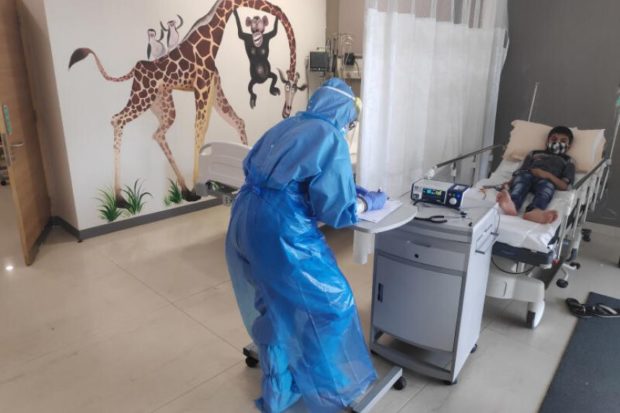More children infected in India’s second and more devastating COVID-19 wave

An 11-year-old with fever and severe cough being examined for Covid-19 at a Bangalore hospital’s exclusive children’s emergency room. The Straits Times/Asia News Network/ROHINI MOHAN
BANGALORE — Nine-year-old Malhar Inimai “was not happy” when he woke up with a mild fever at 3:30 am last weekend.
“I knew it was a Covid symptom,” the fourth grader in Bangalore said. The next morning, Malhar woke up to the “bad news” that he and his grandmother, 67, had tested positive for the coronavirus.
“For the first three days, I felt dizzy and I just wanted to collapse and fall down. After three days, I was okay,” said Malhar.
He described what home isolation meant: he was to stay within two rooms, wear an N95 mask when someone was around and not touch his parents. If he felt feverish or breathless, he had to inform an adult.
Doctors, parents and officials across India say that more children are being infected with Covid-19 and need medical intervention in the devastating second wave of the pandemic than in the first wave last year.
Article continues after this advertisement“The reasons for more infections could be lax behavior, more transmissible strains, or more awareness about testing. But a noticeable medical difference in the second wave is that infected children are more symptomatic than they were last year,” said Dr Digant Shastri, former president of the Indian Academy of Pediatrics.
Article continues after this advertisementThere is no national figure on how many under the age of 19 are infected, but recent government data drawn from around 10,000 patients in hospitals, showed that the proportion aged between zero and 19 had gone up from 4.2 per cent in the first wave to 5.8 per cent in the second.
As vaccines approved in India have not been cleared for those under 18, the only protection for children is masks and social distancing.
“Last Covid season, we saw one child a week with Covid. Now we’re seeing an average of 10 children a day from infants to adolescents. Most are symptomatic – they may not get very unwell but need medical intervention,” said Dr Shrikanta JT, pediatric pulmonologist at Aster RV Hospital, Bangalore.
In the 26 days since April 1, his department’s outpatient ward saw about 300 children with Covid-19. Sixty were admitted, 10 of whom needed critical care.
Moderately symptomatic patients have severe cough, breathlessness, low oxygen saturation levels and inflammation in the lungs.
“Such patients need hospitalization. Unlike in adult Covid patients, we can’t use drugs and steroids not tested on children like ivermectin. We use intravenous steroids with antiviral judiciously for some children under 12 and for those over 12, we use steroids and remdesivir, and if required, tociluzimab,” said Dr Shrikanta.
“The infectivity is more, but mortality among children is still low,” he added.
Mrs Pratibha HB, a psychology professor, was isolated in a critical care room in Aster CMI Hospital with her seven-year-old daughter who not only had Covid-19, but also a kidney infection. The mother does not have Covid-19 but had signed a consent form accepting the risks of staying with her daughter in a Covid-19 ICU.
“I wear a mask all the time and keep a distance. But she is my baby. When they change some of the tubes, it hurts her a lot, so I hold her hand. When she’s lying sick, I can’t think of myself,” said Mrs Pratibha, her forehead creased with worry.
Her older daughter, 11, has also tested positive, and is staying with her aunt now.
Most children, however, have mild symptoms like fever, sore throat, cough, and diarrhoea.
“The good news is that 99 per cent of the infected children only need home care, with healthy food, warm water, cough syrup and paracetamol for fever,” said Mrs Geethamani HB, nurse in-charge of children’s ICU.
But as India records over 350,000 new infections a day, hospitals are finding that entire families are testing positive for Covid-19, making isolation and medical care more complicated logistically.
Parents with Covid-19 have to find caretakers for their children not infected with the virus. Healthy parents have to be isolated from their infected children. One child may be sick while the other may be healthy, and there may not be enough rooms in the house to isolate different people.
All parents admitted that isolation was the hardest to handle.
Malhar, for instance, was coping well until his sister and parents tested negative. “He had hoped we would all be together in this,” said his mother Shabari Rao.
His father had to put Malhar on his lap and hug him till he stopped crying. “They were both in masks, but it’s hard not to hold your kid when he’s upset,” Ms Rao said.
“Children are dependent on their parents, so it is hard to maintain social distance. We don’t ask breastfeeding mothers to stop, or for parents not to show love. But do your best, always wear a mask, sanitize your hands as often as possible to break the chain of infection,” said Dr Shastri.
Malhar’s fever has subsided and now he reads the “avalanche of books” that his aunt has sent, and plays board games with his father. Both wear masks.
One thing, though, truly lit up the boy’s tired face when asked about his recovery. “I have unlimited access to screen time now, so I get to watch TV and play computer games,” he said.
For more news about the novel coronavirus click here.
What you need to know about Coronavirus.
For more information on COVID-19, call the DOH Hotline: (02) 86517800 local 1149/1150.
The Inquirer Foundation supports our healthcare frontliners and is still accepting cash donations to be deposited at Banco de Oro (BDO) current account #007960018860 or donate through PayMaya using this link.